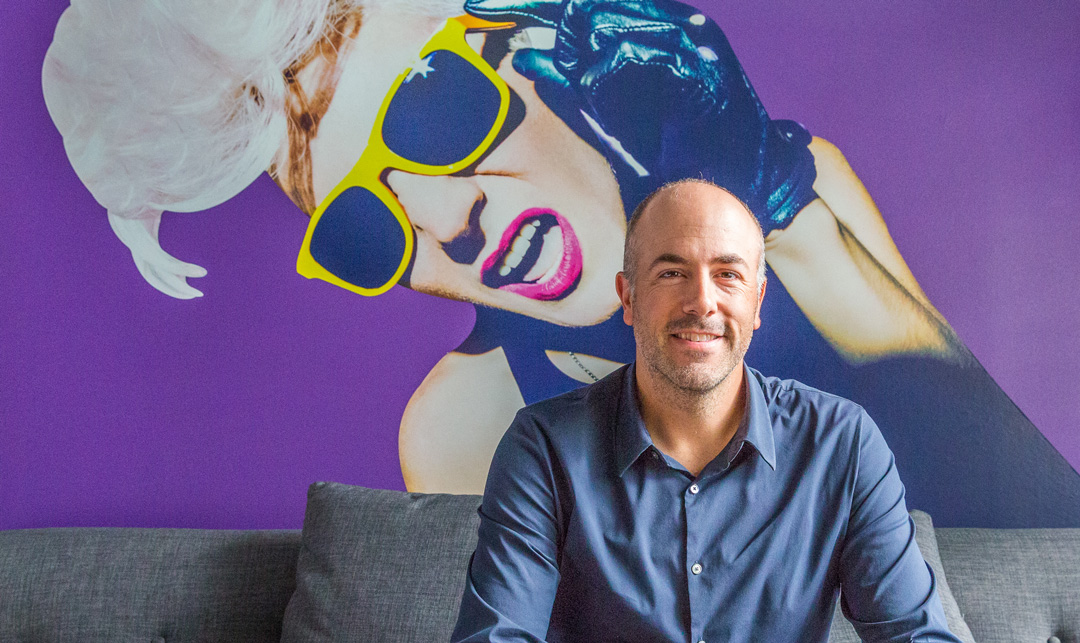The name sets the stage for the Science, Inc. experience. Founder and CEO Mike Jones says the company believes in startups with a formulaic methodology of growth. “I look for businesses where they have positive economics, we can leverage paid marketing dollars in order to grow them, [and] there is a system around them with some level of predictability which is much more attuned to a scientific method rather than random ideas.” Jones understands the mindset of an entrepreneur looking for startup capital, as he has been starting businesses since high school; the music / pop culture magazine he started during college eventually grew into national distribution.
By the time Jones was a senior in college, he had transitioned into running PBJ Digital, building websites and software with his two partners in Eugene, Oregon. When his wife, Jennifer, was accepted into grad school in Los Angeles, Jones moved PBJ to Southern California. He eventually sold his share of the company, then gathered three 24-year-olds and started Userplane, a service that powers chat experiences for dating and language learning sites. In 2006, Userplane was acquired by AOL for $40M. “AOL was my first job. I entered the company as an SVP to oversee Userplane and social initiatives,” he recalls.
After about two years at AOL, Jones switched gears and transitioned into investing. “I was one of the few people in LA who knew how to build and sell tech businesses, and became networked within the early-stage tech community in LA as a very active angel investor.” Jones also spent time in private equity with American Capital, where he participated in acquiring a company, running a company, and joining the board of a company. All three were sold, giving Jones valuable insight into the private equity markets.
Famously recruited out of private equity to run Myspace, Jones took over as CEO with two other guys as a trifecta of management to recover the growth of Myspace. “When it became clear that Facebook was going to win the social battle, we broke up the pieces of the company and sold it off for News Corp,” he says.
The goals of Science are threefold: First, identify great entrepreneurs, get their products live, and find them supporting funding to build their dreams. The second is to drive growth for these businesses, and third is to realize the enterprise value of the businesses through private transactions or IPOs. What does Jones look for in early stage companies seeking his expertise? “We have a strategy that identifies disruptable markets in areas that we think the world will need. We call them disruption spheres of interest,” he says.

Jones passion when discussing his approach at Science was evident throughout CSQ’s time with him
Photos: Neil G. Phillips
“The magic is actually having a brand that connected with you as an
individual and recognized you as an individual customer.”
One example of the Science thesis concerns commerce arising from traditional brands’ lack of customer interaction. “When you have a product you buy all the time and are deeply loyal, it felt odd to me that the brand would never know your name. The magic of direct to consumer wasn’t just getting it delivered through an online purchase – the magic is actually having a brand that connected with you as an individual and recognized you as an individual customer,” explains Jones.
Dollar Shave Club reflects the success of the commerce thesis. Science was the first to invest in the direct-to-consumer subscription razor company, which sold to giant Unilever for $1B in July 2016. The company’s founder Michael Dubin met Jones through a friend. “I saw a big, bold prospective in the men’s grooming market with a distinctive vantage point. I loved his brand, it sounded like a good mission, so I decided to go on the mission together with Dubin,” he says.
The ingredients of a valuable entrepreneur change from sector to sector and firm to firm, but Jones has identified the through-line for Science to be those who are personally connected to the problem, working for reasons way beyond financial reward, highly receptive to advice and guidance, curious by nature, and understand the problem they’re tackling. These entrepreneurs may not know the exact solution but they understand the problem. “I look at early-stage companies and entrepreneurs as putting smart people on boats, setting them in a direction, and hopefully they find the territory they are going after. Never have we executed exactly on the business plan set out; it’s more like, do we have a great captain of this boat?” To Jones, a good captain is not only effective at bringing together great team members and selling others on their vision but is also personally connected. “We are always coming in pre-revenue, and always bet on the entrepreneur first,” says Jones.
Science partner Peter Pham, who has deep Silicon Valley connections, spends all his time socializing their businesses with Valley investors. Jones points out that LA continues to develop better concepts and smarter content, and is pursuing more meaningful businesses than in previous years. Companies with substantial wealth and multi-billion dollar valuations are now staying in LA; Riot Games, Snap, Inc., Cornerstone OnDemand, and Dollar Shave Club are great examples of valuable companies that started, and stayed, in LA. “It’s a great time to be investing in LA,” Jones confirms. “No doubt, LA understands content and brands, and the creative nature of connecting consumers to brands.”

““We are always coming in pre-revenue, and always bet on the entrepreneur first.”
Jones is particularly excited about three main sectors: content for phones, content-driven commerce, and marketplaces. Science continues to build businesses in the social marketplace sector where they can put people with talent to work in new ways. Through the DogVacay app, for example, you can earn income by taking care of other people’s dogs if you love dogs. Or, through the Handstand app, if you are a personal trainer, you can participate in a marketplace that drives more business. FameBit helps build personal businesses by connecting YouTube and Instagram influencers with brands looking for promotion.
Jones thinks that the sector providing entertainment for phones has room for a large shift in strategy and growth – a moment where you could build a major media company through mobile apps, Facebook Live, Instagram, and Snap, Inc. Over the past 18 months, Science has invested more than $5M in its mobile asset base, giving it a unique understanding in driving adoption and consumption within mobile apps for entertainment and content.
Jones’ joy and support system is his wife and two children. He loves his life in Malibu and is completely fulfilled by his family life and his Science life. But be clear, don’t mess with his Amazon account. He says of all the tech that he could do without, he’d rather give up his Google search than surrender his Amazon. “It changed my physical life–wow, you gave me time back!” Time for Jones to pursue his passion of helping people follow their dreams…through Science.

A wall of Science success stories at the base of the Science HQ in Santa Monica, CA














































